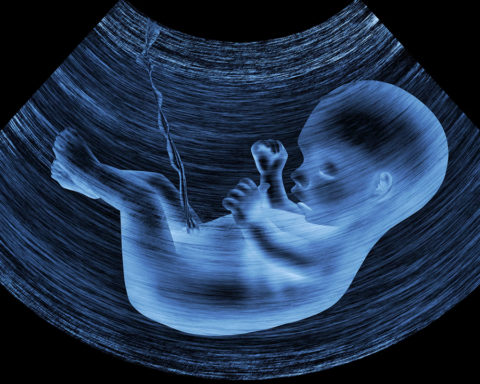A baby or his career? This is the new dilemma that women - American women - may have to face. Facebook and Apple have just offered and reimbursed their employees in the United States, from January 2015, to freeze their oocytes in order to preserve their professional careers. Google is expected to follow. On request, employees of these two companies will be able to make use of this new offer as part of their professional medical cover. Some are shouting scandal, others see this as a managerial innovation. No doubt it will make a lot of noise... And if we took a step back, if we put this proposal in context? Why don't you give your opinion? It's gonna be a long paper, but it's worth the question.
France had reserved this practice for cases of "medical reason" since the bioethics law of July 2011. The Collège national des gynécologues et obstétriciens français (CNGOF) had pronounced in 2012 for the authorisation of this technique. oocyte conservation for societal and not only medical purposes, so that young, non-sterile women can organise their lives as they wish and postpone motherhood without being anxious about their biological clock. This is exactly what Facebook and Apple are setting to music today.
"A Baby or His Job: From Democracy in America to Ethical Downturn? »
Valérie Boyer (1) is a Member of Parliament, rapporteur for the 2011 Bioethics Law; she speaks on this subject in an open forum:
"Facebook and Apple have announced that they will offer their employees financial compensation if they use egg freezing to postpone childbearing for professional reasons.
With twice as many men as women in the workforce, both companies want to reduce this imbalance by encouraging women to "pause" their biological clocks.
These two companies, therefore, meddle in the intimacy of their employees and "reproduction". We are witnessing a veritable takeover bid by these major firms on women's private life, in its most intimate aspects. In the United States, the choice to have a child, to give birth, cannot be subjected to the will of the company. (…)
Today, these two giants of Silicon Valley, propose to freeze oocytes, tomorrow they will propose surrogate mothers? These companies want women to spend more time working, to be more productive, without being bothered by a family.
The freedom lies in allowing women to combine career and pregnancy. Not to consider pregnancy or maternity as a disability or illness and thus open the way to a form of discrimination in hiring.
Until then, it was society that adapted to women's pregnancies, but with this proposal, it is the company that decides who will be able to conduct the pregnancy.
Such a stance also raises a real problem regarding our conception of medicine. If there is no longer a medical problem, can we still talk about medicine? Should our ethical principles be flouted in favour of a false "equality" or under the pretext that other countries accept oocyte conservation for the sake of convenience? The freezing of oocytes for "convenience" presents another problem: it is a real incentive for late pregnancies, whereas pregnancy after the age of 40, whether natural or medically assisted, presents significant risks, which are much greater after the age of 45.
I am in favour of medical progress and the preservation of our rich heritage, but the body must remain inalienable! I have full confidence in our doctors and their ethics! As Rabelais wrote "Science without conscience is the ruin of the soul". Authorizing, in France, the freezing of oocytes for "convenience" would lead to the legalization of GPA, thus opening the way to the commodification of the body without us knowing its limits.
The way in which a woman is treated in a state often provides a measure of the degree of civilization of a society. In countries where Sharia law dominates, women are often killed, tortured or even sold into slavery. In some developing countries, such as India, they are on "farms" and serve as surrogate mothers. Today, in countries dominated by unchecked capitalism, we still all too often see them as the lower sex or as bellies for hire.
France is one of the rare States with a strict bioethics law, particularly since the two laws of 29 July 1994 and thanks to the existence of the National Ethics Committee. Indeed, in 1983, our country was the first State to create a National Consultative Ethics Committee for the life and health sciences. Its vocation is to raise the stakes of the progress of scientific knowledge in the field of life and to stimulate reflection on the part of society. Organ donation, but also Gestation Pour Autrui, sale of gametes - and other medical technologies allowing to push back the limits of the Living. All these subjects should be considered from a triple perspective: medical, economic and ethical. The commodification of the body is a matter of our deepest humanity (...)
The freezing of oocytes in France has only a therapeutic purpose. Indeed, it was designed for women whose fertility is compromised by a treatment with sterilising effects. Today, a patient who has become infertile following cancer treatment can still hope to have a child one day thanks to the prior freezing of her oocytes. We can be proud today of such a breakthrough! Let us not compromise it with sorcerer's apprentices and let us continue to oppose those who would have us believe that before the age of 35, a woman must necessarily choose between her professional success and her family life! »
(1) Valérie Boyer is Member of Parliament for the Boûches du Rhône, Mayor of the 11th and 12th districts of Marseille, Secretary of the National Assembly.
"Homo oeconomicus diabolicus! »
The freezing of oocytes (sex cells that develop into eggs) created in 1986 did not lose its status as an experimental method until 2012 on the other side of the Atlantic. Originally reserved for medical reasons such as breast cancer, which can prevent pregnancy later on, this practice is now becoming increasingly commonplace. The medical profession fears that with such new measures, egg freezing will become a fad.
"It is the very type of technology that offers a priori the assurance of additional freedom for women and for every woman (like, one might think, abortion: a child if I want and when I want...).... and, in fact, it's just the opposite!
Indeed, the open possibility will become... an obligation for all! For all those who not only wish to have a controlled career path, but also for all those... who are afraid of losing their job if they refuse to enter into what will gradually become the Standard imposed by any employer! » says Jean-Paul Karsenty, a senior researcher at the CNRS.

"They're not philanthropists."
In the eyes of Françoise Kourilsky, Coach, lecturer and author of two books on self-actualization, the initiative of Facebook and Apple is anything but disinterested: "They're clearly banking on the resources of the female gender in their business! » Which is, in his view, not bad news either. Women have long demonstrated the benefits they bring to the various boards on which they serve.
70 % of Apple's 98,000 employees worldwide are male, with the figure rising to 80 % for technical positions. The finding is similar for Facebook, but the proportion of male "techies" increases to 85 %. It is obvious that these companies are far from parity!
The proposal of these companies to put aside the pregnancies of their employees seems to promise women to postpone their personal project for only a few years. Except that when they are older, their eggs will not lead to the long-awaited baby for various reasons of absolute non-guarantee of results (2)it'll be too late. Facebook and Apple will have taken advantage of the talent and work of their employees; as for the women, won't they regret having resigned themselves? At what point in their lives will they defrost their eggs? Is it retirement? Or after a few years of work when their bosses decide to replace them with younger ones and put them in the closet?
Offering women the option of freezing their eggs in order to favour their careers suggests that work and motherhood cannot coexist. In a society where equality between men and women is far from being achieved, is this a new step backwards?
It's a modern initiative, a precursor but also costly," says Dominique Druon, Aliath's director. Indeed, freezing is not within the reach of all the scholarships that would like it. In the United States, freezing costs on average between $10,000 and $20,000 for each freeze and $500 in annual conservation costs.
(2) 70 to 80% of women end up giving birth after in vitro fertilization with their oocytes but that leaves 20 to 30% of patients who will say goodbye to their dream of giving birth. Moreover, these statistics are only valid if freezing is done under optimal conditions. That is to say, according to the French National College of Gynaecologists and Obstetricians (CNGOF), between 25 and 35 years of age. After this age, the results are significantly lower. At 40, for example, the woman has only 5 to 10% chances of pregnancy with this technique. And even if your eggs are frozen before the age of 35, it is still possible that doctors will refuse in vitro fertilization if you have diabetes or are in poor health. In women, the quality of the eggs is the first thing to fall, starting at the age of 35. The deterioration in the quality of the uterus comes later. This is why there are women who have been able to carry other people's babies at 50 or 60 years of age. In practice, you can never be 100% sure that this will result in a birth. The older we get, the more difficult the pregnancies are and the greater the risk of complications during childbirth.
The end of a taboo?
"And if this measure (validated since 2012 by the American Society of Reproductive Medicine) was simply the pill of our times? asks Jessica Bennett, columnist for The New York Times. The one that would break one last taboo, one last biological straitjacket."This is the inequality between men and women in terms of career opportunities.
In Le Figaro.fr, a study by the magazine Fertility and Sterility, which was picked up by the American media, reveals that a majority of the women questioned who were able to put their biological clock on hold in this way have since experienced a feeling of "empowerment", a real psychological assurance seen as a powerful "equalizing" factor in the job market.
The philosopher and theologian Bertrand Vergely (3) declares: "Until now, a woman might not be hired because it was assumed that she would have to leave, take care of her children and therefore could not be counted on. This measure can therefore enable these women to overcome this discrimination: the company is fighting against its own sexism, and this measure is a real step forward. »
Manipulating life?
But he completes: "On the other hand, under the pretext of respecting women as persons, we may not sufficiently respect human beings as persons. From the moment you freeze eggs, sperm, and begin the process of artificial reproduction, you are manipulating the human being. In this, procreation becomes technical, impersonal, outside the body of the parents. Moreover, Google, for example, Facebook or Apple actually use this proposal to make money: women become even more corruptible, freed from the concern of motherhood, and can therefore devote themselves body and soul to the business. The most striking thing is that this gain in productivity, hidden under a feminist envelope, gives an excellent image to the company...".
For Laurent Alexandre, a specialist in transhumanism: "oocyte freezing is a step towards " meilleurs embryons ", which should be possible in about ten years". Are we moving towards the advance of the transhumanist ideology, this current of thought believing that science should make it possible to improve human capacities?
"This is a concrete illustration of the trivialization of in vitro fertilization, which is destined to become the main mode of fertilization. The freezing of oocytes is a further step towards the selection of embryos, towards which we are moving at full speed today. In order to achieve this, in vitro fertilization will have to be carried out. In the second half of this century, it will be seen as incongruous to have fertilization that is not in vitro. It will seem as bizarre as giving birth at home without an epidural.
We can clearly see the different fields of extension of in vitro fertilization: initially sterility, then homosexuality, then embryonic diagnosis in cases of rare diseases, the storage of oocytes for reasons of comfort, and afterwards will come the generalization of sequencing and the choice of embryos for purposes " eugénistes 2.0 ". We are witnessing a continuum in the trivialization of in vitro fertilization. The ultimate technology will be the artificial uterus, but this will only happen after 2050."
"When your embryo is stored, it gives you the opportunity to make selection in the future. This is only an intermediate step, because the next step will be to make eggs from iPS cells (induced pluripotent stem cells, capable of making cells of any type), a technology that has already been tested in animals and will be developed in humans from 2020-2025. Storage is in fact only an intermediate technology, as was the Minitel in relation to the Internet. The final step will be to manufacture oocytes in large numbers from skin cells, and since we have an unlimited number of sperm cells opposite, to sequence a high number of embryos to choose the best of them - " meilleur " being of course quite subjective. »
Invasion of privacy?
Valérie Rozée, a researcher at Ined (Institut national d'études démographiques), a specialist in gender and reproduction issues, states in an interview at l'Express.fr : "We're not used to having companies reimburse what you might call "convenience fees". Is it really a convenience, or on the contrary a real way to improve gender relations at work? »
In a nutshell, "what do I care?". What does this hold of Capital over the private sector mean?
Even if the French social security system is in an abyssal hole, our health care system created in 1945 protects the majority of the population and makes France the country with the highest level of health care in the world. the best system in the world (but not the most effective), unlike the United States ranked 46th.
In the United States, when we hear about reforming the health care system, it is because the number of people without health insurance is constantly growing (60 % of Americans have private insurance) and the quality of care is very uneven. There is no mandatory system that covers the entire population. This is the logic of a liberal system organised around a private insurance industry, financed on the basis of actuarial premiums.
The Medicare system does exist, however, and is similar to health insurance in France, except that there are flat rates to be paid before being reimbursed and the co-payment is higher than in France.
There are also Health Maintenance Organisations. These are health centres where patients go directly for consultations. 70 % of HMOs, now called "managed care organizations", are private for-profit. The United States is the only country that has such a large sector of publicly listed health care providers.
The recourse to the private sector is a good illustration of the neo-liberal orientation of the leaders: more room for the private sector, for the free market. Public spending must be cut back and economic growth must be safeguarded for the better-off...
Is there a serious threat to people's values and commitment to an equitable health care system for all?
Jacques Testart, a pioneer in assisted reproduction methods, the "scientific father" of the first French test-tube baby states in Le Figaro.fr that "It is not innocent that companies like Apple or Facebook, with their ideology, initiate this movement. Let's not forget that Google funds research on transhumanism. In France, it seems a bit crazy to us, but in the United States, it represents huge investments. Facebook is a multinational company that addresses itself to friends and friends of friends... Ideas spread very quickly and level out. »
Minister Marisol Touraine spoke on Wednesday about Europe 1concerned to hear that "it's a business-driven project." "The debate is a medical, ethical debate, it's certainly not a debate for human resources managers", she warned.
So, what do you think?
Wouldn't all this be a symptom of human temporality? Life expectancy has been constantly increasing over the last few decades, the time of our daily lives is shrinking in the instant, in real time, in the immediate; yet the time of the human body in its essential function with regard to the species, reproduction, is unchanged.
The sliders of our different temporalities evolve, the slider of female temporality remains unchanged.
Once upon a time, a woman was wife and mother. Since the end of the 20th century, she has conquered control of her fertility and economic independence.
Nevertheless, motherhood is and will remain its state of nature. Will she now be able to secure her fertility and delay the age of pregnancy to give herself a few more years to stabilize a professional life and build a personal life to welcome a child in the best conditions? As Françoise Kourilsky thinks so,(3) " my conviction is that today we must realize that nothing is ever too late or too early. Rather, we need to feel ready, and no longer get caught up in timing conventions.
What do you think?
(3) Françoise Kourilsky is a Doctor of Psychology, a graduate of Sciences Po; in her doctoral thesis she developed an original approach that applies to managerial communication, change management, negotiation and conflict management.
- Book " Deviens qui tu es : La philosophie grecque à l'épreuve du quotidien " by Bertrand Vergely (Ed. Albin Michel, 2014).
- Article "Vices and Virtues of the American Health Care System"Le monde.fr
- Book " Faire des enfants demain " by Jacques Testart - (Ed. Seuil 2014)
- Article : "Facebook, Apple, frozen eggs and "progress" for profit."by Natasha Polopny












